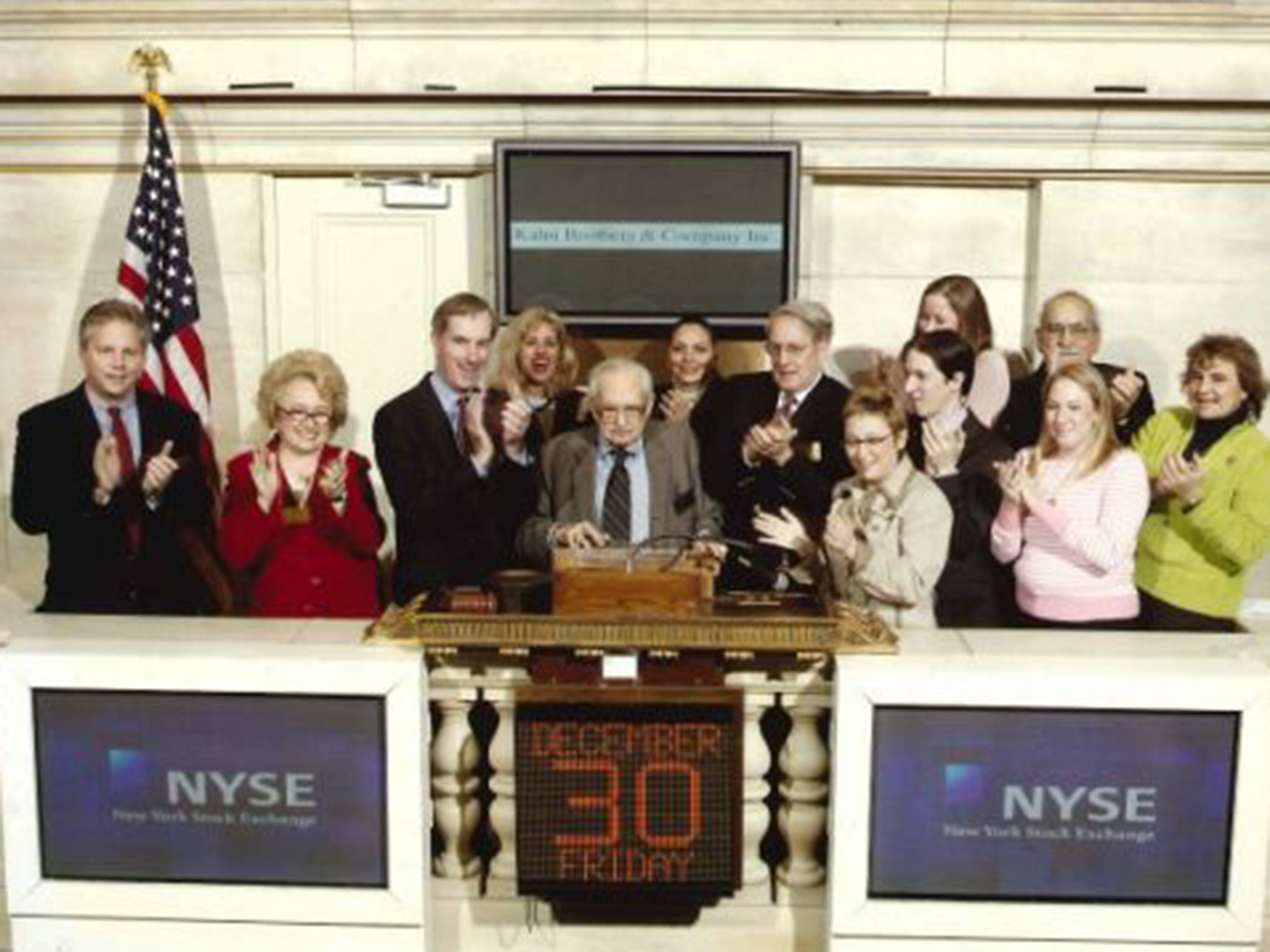Irving Kahn: Businessman and investor who began in the 1930s and continued working on Wall Street into his 12th decade
Until his death at 109, Kahn was Wall Street's oldest stockbroker and presumed to be the world's oldest active investment professional

The secret to value investing is holding on to underpriced stocks for a long time until they reach their true value. Few people were in a position to follow through as literally as Irving Kahn, who until his death at 109 was Wall Street's oldest stockbroker and presumed to be the world's oldest active investment professional.
The son of Jewish immigrants from Poland, Kahn landed his first job as a runner delivering papers and securities on the floor of the New York Stock Exchange a few months before the 1929 stock market crash. "After one week of working there, I decided to quit because I thought the people were crazy," Kahn recalled in 2012. "They were running around and screaming at each other during trading hours, and they were like clowns!"
His boss persuaded him to stay in finance, and he became a brokerage assistant at the old exchange firm H Hentz & Co. One evening, he asked a bookkeeper to show him the company's profit-and-loss ledgers. His eyes immediately fell on a series of investments that consistently made money and rarely lost profit. They all belonged to one person: Benjamin Graham. "I went over to Graham's offices at the Cotton Exchange on Beaver Street and that was the beginning of my career," he said.
The strategy of Graham, commonly considered the "father of value investing," was to buy up large shares of businesses that had long-term growth prospects but were temporarily underpriced. His investment philosophy influenced hordes of young investors, among them Warren Buffett.
Kahn sought out Graham and became his full-time teaching assistant at Columbia Business School in the early 1930s. He also contributed statistical material to Graham's and economist David Dodd's influential 1934 text, Security Analysis. "I stopped wasting time on what people claimed a stock was worth and started looking at the numbers," Kahn said. He remained close to Graham until his death in 1976.
Kahn was a partner at several investment firms before establishing an investment management and advisory firm in 1978, what is now Kahn Brothers Group, with two of his sons. The Kahns adhered to Graham's value methodology. "If we buy something which is generally well thought of by the Street and popular, then we're probably doing something wrong," he joked in 1995.
As of 2014, the principals of Kahn Brothers Group managed nearly $1 billion in assets. The firm's largest stockholdings include the pharmaceutical companies Pfizer and Merck, Citigroup bank and the New York Times.
During his career, Kahn saw crashes and recoveries, depressions and recessions, bubbles and bursts. Through it all he stressed the virtues of long-term trading and discouraged gambling investors, whom he saw as interested only in making a quick buck. To generate new investment ideas he read at least two newspapers daily and hi-tech scientific journals. "I read no fiction, no mystery stories and no sex novels," he said. "So, that leaves a lot of time for science."
Kahn was born in New York in 1905. His father was an electrical-fixtures salesman, and his mother ran a shirtwaist shop in their home. He attended City College of New York for two years before leaving for Wall Street.
He was part of an age-defying family and one of four centenarian siblings; his younger brother, Peter, died aged 103, while his older sisters, Helen and Lee, died at 109 and 101 respectively. The Kahns were believed to be the world's oldest quartet of siblings, and his family's longevity was studied extensively through the Longevity Genes Project at Albert Einstein College of Medicine in the Bronx. Researchers found that all the siblings possessed a gene, CETP, that controls cholesterol and protects against Alzheimer's and heart disease.
Kahn was a founder and past president of the old New York City Job and Career Center, which provided job skills and career opportunities to thousands of high school students, and a founding member of the New York Society of Security Analysts. Until recently he reported regularly to work as chairman of the family firm. He took the bus or, when the weather was favourable, walked the 20 blocks from his Upper East Side home to the firm's Madison Avenue office until he reached 102.
"One of the nice things about this business is that there's no mandatory retirement age," his son Thomas Graham Kahn once joked. "And you allegedly get wiser as you get older." Kahn's two eldest sons retired before their father in their mid-70s.
At 108, Kahn continued to have an insatiable curiosity and appetite for Wall Street. "I would pay you if you took it away from me," he quipped. "I'd try to buy it back."
MEGAN McDONOUGH
Irving Kahn, investor: born New York 19 December 1905; married Ruth Perl (died 1996; two sons, and one son deceased); died New York 24 February 2015.
© The Washington Post
Join our commenting forum
Join thought-provoking conversations, follow other Independent readers and see their replies
Comments